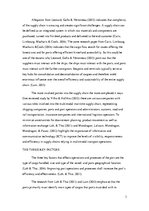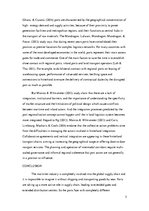-
Role of Ports in Supply Chain Management
2011. - 2020. g.
CONCLUSION
The maritime industry is completely involved into the global supply chain and it is impossible to imagine it without shipping and transporting goods by seas. Ports are taking up a more active role in supply chain, leading to extended gates and extended distribution centres. So the ports face with completely different circumstances every day. To achieve the best outcome and results of their performance existing plans and policies need to be monitor all the time to notice new challenges and surveys for new improvements.
Daily port operations and offered services are very much connected with port users. It is very important to investigate in port infrastructure such as improve and endorse suitable berth for vessels, improving port traffic and develop better cargo stowage systems. The geographical location of the port plays a major role in economic and strategy aspect. The local, national and regional economy will always be connected with entire global supply chain. The cooperation and information sharing with ports acting as the facilitators, technology playing a key role in information exchanges between the different stakeholders.
…
Nowadays a customer satisfaction is one of the main creators for successful entrepreneur`s performance. According to Lam (2015) and Caris, Limbourg, Macharis & Cool (2014) cost and price competitiveness, pollution reduction, efficient use of fuel and resources, integrated into the intermodal chain, with quality jobs occupied by a skilled workface, and stick to high environmental standards, health, safety and security are main factors that influence port`s daily requirements. Also low freight rates and competitive shipper demand at supply chain have a big impact on harbour. (Lam, 2015) Song & Parola (2015) research endorse the competiveness of the harbours becomes a subject of increasing significance for companies involved in a supply chain and the impact or port activities on the environmental, social and economic development of the regions in which the ports is located. According to above mentioned allegations it is worth to take a look on the ports overall impact and connections with Supply Chain, as well mention the main three key factors which describe and influence ports characteristics. In this case - type of cargo, type of vessel, and geographical location.








